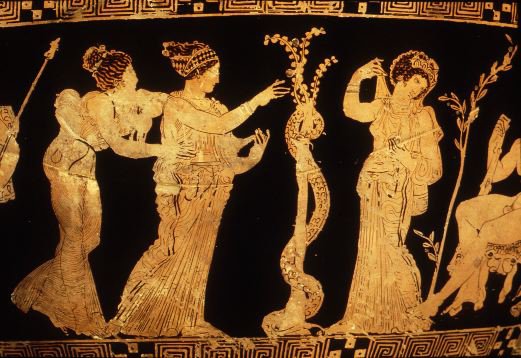
After eight years and one month, performing ten superhuman labors, he was still not off the hook. Eurystheus demanded two more labors from the hero, since he did not count the hydra or the Augean stables as properly done.Eurystheus commanded Hercules to bring him golden apples which belonged to Zeus, king of the gods. Hera had given these apples to Zeus as a wedding gift, so surely this task was impossible. Hera, who didn't want to see Hercules succeed, would never permit him to steal one of her prize possessions, would she?
http://www.perseus.tufts.edu/Herakles/apples.html
THE THREE HESPERIDES were goddesses of the sunset. Together with the hundred-headed Dragon Ladon they were appointed to take care of the Tree of the Golden Apples, a wedding gift from Gaia to Hera.In Greek mythology, the Garden of Hesperides contained trees with golden branches, golden leaves and golden apples, Gaia's wedding gift to Hera upon her marriage to Zeus. In the tale of Hercules, his eleventh labor was to retrieve the golden apples and bring them back to the king who had ordered him to complete twelve tasks. He is shown in front of the tree with one of the Hesperides, daughters of Atlas, who guarded the tree along with the dragon Ladon, also depicted here. The next print shows Hercules talking with one of the Hesperides, and taking a golden apple while she sleeps.
Sumerians
The first Sumerians lived in the plains of what is now southern Iraq. The Sumerian word for plain is "edin", and it is very likely that the name "Eden" has derived from this.

The fierce dragon/serpent of Ladon who guarded the golden apples of Hesperides. (Perides=Paradise)
Eden as Paradise
The word "paradise" that Christians have made a synonym for the Garden of Eden is a Persian word, which describes a walled orchard garden or an enclosed hunting park. It occurs three times in the Old Testament, significantly not in connection with Eden: in the Song of Solomon iv. 13; Ecclesiastes ii. 5, and in Nehemiah ii. 8. In the Song of Solomon, it is clearly "garden;" in the second and third examples "park." In the post-Exilic apocalyptic literature and in the Talmud, "paradise" gains its associations with the Garden of Eden and its heavenly prototype. Literary Hellenistic influences led to the Pauline Christian association of "paradise" with the realm of the blessed. The Greek Garden of the Hesperides influenced the Christian concept of the Garden of Eden, and by the 16th century, in the Cranach painting (see illustration), only the action that takes place there identifies the setting as not the Garden of the Hesperides, with its golden fruit.

http://www.wordiq.com/definition/Garden_of_Eden

http://home.swipnet.se/~w-54567/hera/11.htm
http://www.theoi.com/Khaos/Hesperides.html
http://www.business-esolutions.com/star ... cles12.htm
http://www.georgeglazer.com/prints/aand ... kherc.html
http://homepage.mac.com/cparada/GML/HESPERIDES.html
In Greek mythology, Gaia, or Mother Earth, presented a tree with golden apples to Zeus and his bride Hera on their wedding day. Guarded by Ladon, a serpent who never slept, the apple tree was in the garden of the Hesperides, daughters of the Evening Star. These golden apples became involved with many tales of love, bribery and temptation ranging from the abduction of Helen of Troy to the defeat and marriage of Atlanta. The sexual and romantic connotations of the apple were powerful reasons why apples came as dessert at the end of the meal. They not only tasted heavenly and were good for digestion but were regarded as a cunning transitional aphrodisiac for the pleasures that followed. Is it any wonder that apples became the most sought after fruit on earth? They have taken their rightful place in the pleasure gardens of the wealthy throughout the world in spite of the almost instinctive knowledge that eating them may lead one to a life of chaos and destruction.
http://www.lyndfruitfarm.com/great.htm

Heracles on his penultimate task was asked to pluck three golden apples from the tree of the Hesperides, (nymphs of the evening). Gaia, the earth-mother had given Zeus and Hera golden apples as a wedding gift. Hera planted them in her garden, which was far to the west and close to Mount Atlas. To guard the apples Hera sent Ladon, an immortal monster with one hundred heads. It was yet another offspring of Echidna and Typhon. Also guarding the tree where the Hesperides, who were the daughters of Nyx and Erebus, but some versions say that Atlas was their father. Some versions say seven, but most legends say there were three Hesperides but it can vary; Aigle, Arethusa, Erytheia, Hespere, and Hesperethusa are some of the names given to them.
On his way Heracles liberated the titan Prometheus, who Zeus had chained to a rock as punishment for his ills against the great god. Each day his liver was torn out and eaten by an eagle (in some legends it was vultures), then every night the liver would grow back, to be torn out again the next day. Heracles released Prometheus from his daily torture. In gratitude he told Heracles not to take the apples himself, but to seek the help of Atlas, who was brother of Prometheus.
http://www.pantheon.org/articles/a/appl ... rides.html